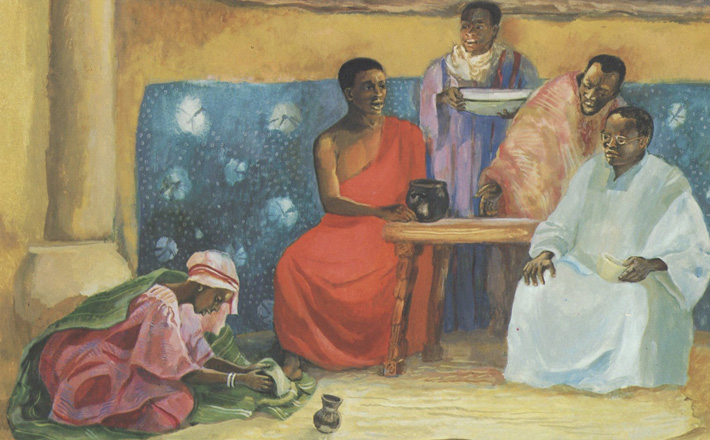Commentary on Galatians 2:15-21
The great theme of Paul’s letter to the Galatians is Christian freedom.
That theme has already been sounded in the letter’s opening verses, where Paul praises “the Lord Jesus Christ, who gave himself for our sins to set us free (Greek deliver us) from the present evil age” (Galatians 1:4). And Paul also reintroduces the theme when he introduces some of his main antagonists in the Galatian communities: “But because of false believers (Greek brothers) secretly brought in, who slipped in to spy on the freedom we have in Christ Jesus, so that they might enslave us … ” (2:4). Finally, Paul concludes the great Allegory of Hagar and Sarah in 4:21-5:1 thus: “For freedom Christ has set us free” (5:1).
Context
As the NRSV footnote indicates, it is not certain whether the quotation of Paul’s previous words to Peter carries over into the section at vv. 15-21 and, if so, precisely where it ends. Either way, the current pericope carries on and supports Paul’s thought as he has been developing it in the preceding verses.
Peter had participated in common meals with mixed groups of Jews and Gentiles, in which Jewish Christians relaxed their adherence to Jewish food laws. But under perceived pressure from members of the Jewish Christian church in Jerusalem, Peter pulled back and resumed the life of a law-observing Jewish Christian. Paul took this to mean that in Peter’s opinion, all Christians, including Gentile converts, must observe the Jewish food laws. Paul took exception to this.
Paul’s Law-free Gospel
Paul begins this section of text with a clear statement of his central theological affirmation: “ … we know that a person is justified not by the works of the law but through faith in Jesus Christ” (Galatians 2:16a).
Paul’s use of the singular “a person” makes it sound like he is addressing individual salvation. However, his actual point is different: “The issue is corporate fellowship, not individual salvation.”1 Moreover, contrary to appearances again, “Paul is not against the law or Judaism as such, but opposes the imposition of the law on Gentile Christians.”2 As missionary to the Gentiles, Paul was convinced that Gentiles should not have the Jewish laws regarding circumcision, food laws, and observance of special holy days imposed upon them.
Be that as it may, it certainly appears that his attack is directed against the Jewish law. An attractive middle road interpretation is available to us: “In his fight to obtain and hold on to his [Gentile converts] Paul fiercely but unfairly … attacks the quite normal Judaism of his opponents.”3 This interpretive option allows us to explain why Paul seems clearly to attack the Jewish law while at the same time not actually being opposed to it. Perhaps Paul had no objection to Jewish Christians continuing to observe the law; he does not directly address that point. He simply did not want the law imposed upon those non-Jews to whom he had been sent in mission. Paul’s argument can be seen as unfair insofar as it presents only the negative side of the law; it does not present the whole story, both sides of the law, good and bad.
In these initial verses of our pericope, then, Paul elaborates his understanding of a law-free gospel: the gift of freedom in Christ is, in this instance, freedom from the demands of the Jewish law.
But whose faith?
Paul’s logic is significantly strengthened by an ambiguous phrase that occurs three times in our pericope. As the NRSV footnote states, Paul’s phrase “by faith in Christ” may also be translated “by the faith of Christ,” which, in turn, may be translated “by the faithfulness of Christ,” referring to his steadfast adherence to the will of God and his endurance all the way to the cross. The net effect of this ambiguity is that if the latter translation be preferred, then justifying faith is itself not a human work. Paul would then not be contrasting one human work with another, not contrasting the works of the law and the work which is believing in Christ, and claiming that one kind of human work saves while the other does not. He would be contrasting all human works, be they of the law or of faith, with God’s saving act in Jesus Christ, which by itself is sufficient for justification. While Paul certainly values the human work of faith, as he does in the middle clause of v. 16, his point would be that the ultimate efficacious work of justification/salvation belongs solely to the work of God in Christ.
Thoughts and questions toward preaching
In his mission to take to gospel of Jesus Christ to non-Jews, Paul confronted the large questions of ethnic and religious practices and requirements for Christians of different backgrounds and traditions.
How do we as the church measure up in these kinds of questions?
To what extent are our congregations mixed at all, combinations of people from divergent ethnic and religious/denominational backgrounds?
Do we diligently strive to find ways to be both fully respectful of racial/ethnic differences among the people while at the same time being mindful and discerning of what are those things that are and are not essential in making us who we are?
In our churches, do we implicitly or explicitly require new participants (“members”) to conform to previously existing patterns of congregational behavior? Are there requirements or expectations for specific doctrinal affirmations or other expected behaviors?
How diligent are we in discerning what is necessary and what is contingent in these matters of congregational life and faith?
And as important as these matters are, — and they are very important — do we really and truly take to heart Paul’s message that no human acts or works, none whatsoever, are what ultimately justify us with God?
May God help us to live into the freedom of the Gospel.
Notes:
1 M. Eugene Boring & Fred B. Craddock, The People’s New Testament Commentary (Louisville: Westminster John Knox Press, 2004), 583.
2 Boring and Craddock, The People’s New Testament Commentary, 583.
3 John Dominic Crossan and Jonathan L. Reed, In Search of Paul: How Jesus’s Apostle Opposed Rome’s Empire with God’s Kingdom (HarperSanFrancisco: 2004), xi.


June 12, 2016